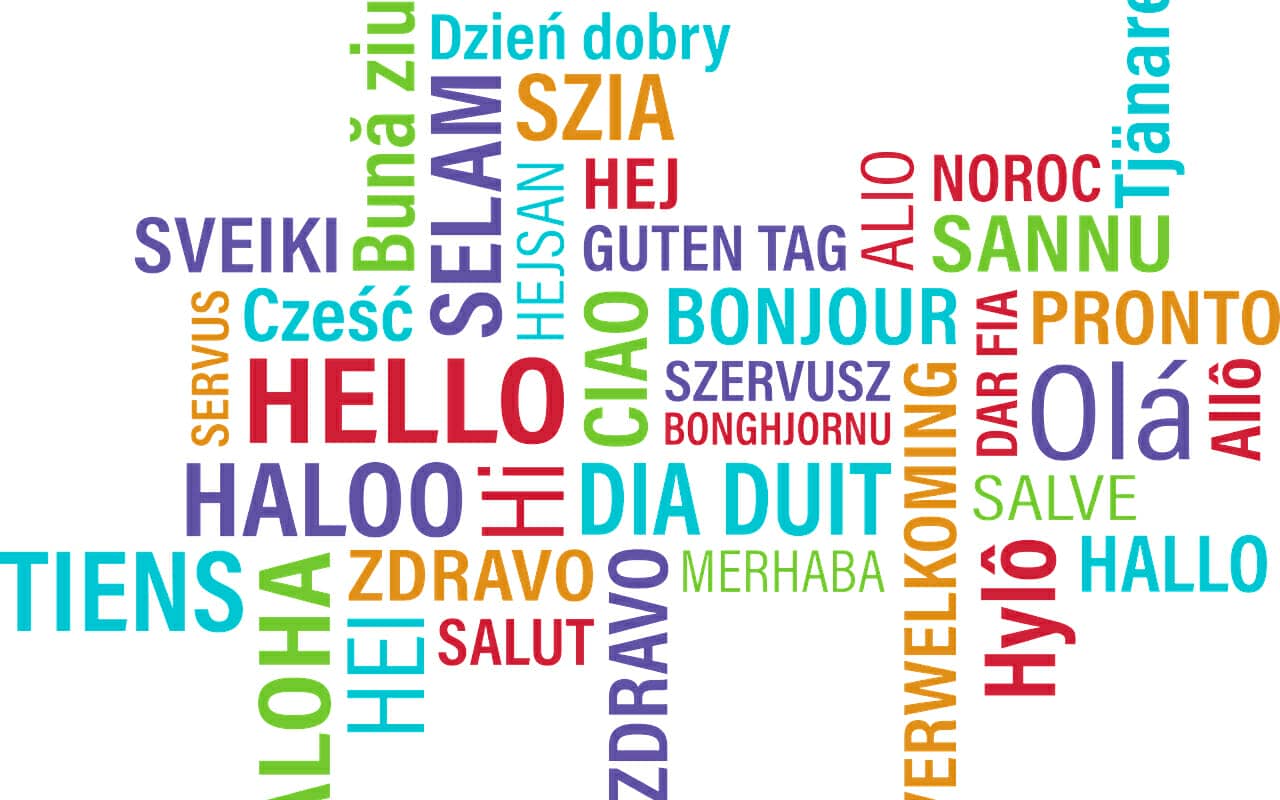
Most people think learning more than one language at a time is a recipe for burnout.
And they’re right.
At least, they are if you’re relying on motivation, random apps, or cramming vocabulary lists with no structure.
But if you have the right memory systems, goals, and practice rhythms, you can learn two, three, even more languages at the same time.
Not only that, you can actually enjoy the process.
I say that not just as a memory expert, but as someone who’s lectured in German, passed exams in Mandarin, and recited Sanskrit from memory during my TEDx Talk.
I managed to study both Mandarin and Sanskrit at the same time without issue.
And while I was preparing my my PhD in Humanities, I studied Biblical Hebrew, Latin, and modern languages like German for pleasure and professional research.
And I’m not alone. Polyglots like Luca Lampariello and Steve Kaufmann have shown what’s possible when you combine discipline with joy and intelligent methods.
The truth is: once you’ve truly learned your first language, a shift happens. You gain the meta-skills, the confidence, and the momentum to add more.
In this post, I’ll show you:
- How to grow your capacity for multiple languages without chaos
- Why most adults underestimate their ability to learn
- And the systems that make it all manageable. Even joyful.
Ready?
Let’s dive in!
How Many Languages Can You Learn at Once (Realistically)?
The truth is that most people can barely find time, focus and energy to learn one language at a time.
And there’s no shame in this. None whatsoever.
But when I was in grad school and needed to learn Biblical Hebrew as part of my Phd, I also kept up with German. At least a little bit.
Later, when I was in Germany, however, I focused solely on acquiring German.
Even though I know how to learn languages in that particular case, I had so much going on in my career, it made sense to buckle down.
It was only after I passed my German exams that allowed me to obtain permanent residence that I returned my focus to strategically learning more than one language at the same time.
Why Children Learn Languages Differently (And Why It Doesn’t Apply to You)
Now, you may have heard that children can learn multiple languages with ease.
This is true to a certain extent. For one thing, kids are very good at learning out of context. In other words, they’re not looking for the meaning in everything. They’re just observing and absorbing without the contextual judgments adults have been trained to make.
And here’s the problem with that: As mature individuals, we often have misconceptions about our adult learning styles and even how to create or optimize a proper learning cycle.
The Truth About “Socially Contingent Partners” and Real Fluency
So if one thing is true, it’s that children tend to enjoy high levels of access to what some scientists call “socially contingent partners.” These are people willing to not only correct children as they learn languages, but to do so with reasonable accuracy.
In other words, this means that children can only pick up languages relative to their access to socially contingent partners.
In Germany, some kindergartens will speak up to three languages at once. Many experts think three languages at once is the sweet spot in order to provide enough access to socially contingent partners. But three languages offered in one kindergarten was still relatively rare as of 2014.
Language Learners Should Not Compare Themselves To Children
Although it’s tempting to think that children are exceptionally good at learning languages, this isn’t really true. Yes, they’re good at picking things up without them needing to be contextually related.
But think about it:
A shockingly high level of kids cannot write grammatically correct sentences even after graduating from high school.
And in order to pick up another language, studies have shown that they would need lots of writing practice in each language under instruction in order to develop meaningful fluency in the language.
This means that kids are just as time-strapped as adults. All the more reason to teach the young learners in your family all about mnemonics.
How Many Languages Should You Learn at Once in Light of This?
The reality is that most of us will need to focus on one language at a time.
At least until we have some skills with language learning as a process unto itself.
Then, once we have developed the meta-skills involved in learning new languages, I suggest you focus on learning 2-3 languages maximum at any given time.
Why?
One reason boils down to what scientists call interleaving.
Interleaving: The Polyglot’s Secret to Avoiding Burnout
This learning technique involves alternating between different topics or skills during study sessions, rather than focusing on just one at a time.
When applied to language learning, interleaving helps reinforce distinctions between languages by forcing the brain to actively retrieve and switch between vocabularies, grammar rules, and pronunciation patterns.
This mental effort might seem draining.
But it actually strengthens your memory and reduces interference over time, especially when the languages are similar.
Interleaving also mimics real-world conditions where multilinguals naturally shift between languages, making recall more flexible and adaptive. As a result, learners develop deeper understanding and more robust memory traces for each language.
Boost How You Study Multiple Languages with the Right Software
For some people, choosing languages that are close, such as Spanish and French w be helpful. I’ve found that it’s especially enjoyable to use a process called “laddering” by using Netflix or other streaming services to study one language based in another I already know.
For example, I can listen to a program in German while reading the subtitles in Dutch. It stretches the brain, but is still effective, provided the foundational language is strong enough.
For more on Netflix and other programs that will help you, please see my guide to the best language learning software programs.
Even better, you can use ancient mental technology like the Memory Palace technique to help, especially once you have an accurate understanding of how many words you need to learn.
There’s also the Memory Palace specifically for language learning to check out.
Psychological Pitfalls & How to Handle Them
I’ve helped thousands of language learners over the years through my courses and “Learn and Memorize” series of language learning books for Spanish, French, German and other languages.
One huge problem people face is that many cultures normalize forgetting. People believe that the reason they struggle to learn languages is because they have a poor memory.
But the reason they believe that is because the message entered their implicit memory long ago.
When you believe that you have a poor memory, it can be difficult to adopt the identity of a language learner.
But as my podcast Nir Eyal told us, adopting the right identity is essential to success.
Likewise, the famed polyglot Luca Lampariello has talked on my podcast about how you essentially have to court languages by adopting the mindset of a lover.
Unfortunately, a lot of people are stiff and struggle to forge such emotional connections. I was like that too for a long time, but found hope by developing each of these autodidact personality traits.
If you do the same, you’ll overcome many of the pitfalls that might be holding you back from learning multiple languages.
Is It Possible To Learn Every Language?
Theoretically, yes. Given enough time and access to socially contingent partners who can correct your mistakes.
But we face limited time. Many of us also have working memory issues that limit our ability to focus on sounds and structures we haven’t encountered before.
And we also face the fact that many languages simply aren’t in use at all.
In some cases, there are languages that are used by such small numbers of people that accessing qualified learners will present a substantial challenge.
Limited access to teachers is an obstacle I’ve faced when trying to find language instruction in indigenous languages in both Canada and Australia. Many of my polyglot friends have expressed despair over this problem.
Of course, limited access to teachers shouldn’t discourage you whatsoever.
For example, the Ancient Language Institute does great work in providing you with experts who can help you in a variety of languages. Likewise, there are classes available in Sanskrit, Classical Chinese and Navajo.
Once you have the right resources, the tips on how to become a polyglot will help you further with studying multiple languages at the same time.
How Many Languages Can One Person Learn?
Here’s the great news:
Many people exist who have learned 20 or more languages.
Steve Kaufman is one example. And he’s frank about how he spent his time in order to make this happen. (Hint: It’s pretty much the same as the suggestions given above.)
Of course, he had a head start with some early bilingual experiences. He’s also been at it for over 50 years, but didn’t start on his 9th language until he was 60. It’s also important to know that he created and represents a language learning site, so it is a professional focus.
In other words, don’t pressure yourself to learn a language overnight! Kaufman didn’t and his background and interests propel him in ways that many people won’t have. Remember: Motivation is not to be relied upon – at least not entirely.
Plus, there are many benefits to language learning, even if you only just learn one foreign tongue partially. Studying Latin for fun and the mental fitness of it has helped enrich my life tremendously, for example.
Motivation Won’t Get You There, But These Systems Will
If motivation isn’t the key, what is?
Systems and goals.
I know that my approach to language learning without motivation is controversial. But think through the logic.
Rather than waiting to feel motivated, create a learning system that involves regular exposure to not only the languages you want to learn, but also the people who can help you.
Make lots of mistakes.
And use the Big Five of Language Learning:
- Reading
- Writing
- Listening
- Speaking
- Memorizing
More On My Language Learning Journey (and Why It Matters for You)
As a lifelong language learner, I’ve explored everything from modern languages to memorizing ancient mantras in complex scripts.
Not just for academic purposes, but as part of my daily commitment to bringing memory training together with meaning.
These days, I use interleaving to maintain my fluency in German, speak Mandarin daily with my wife and deepen my ability to recite Sanskrit slokas from memory.
I’m also continually building my Latin skills, both through reading and memorizing phrases. I also speak those phrases every change I get.
My journey has taken me from university lecture halls to TEDx stages, all thanks to finding ways to work multiple language study into my daily life.
And my speciality though the Magnetic Memory Method is helping people memorize words and phrases.
If you’d like to learn more about how memory techniques can help, check out my FREE Memory Improvement Kit:
It’s not exactly a magic bullet, but it has always made the process much more fun and engaging for me.
Plus, it’s easy to use it systematically and learn vocabulary and phrases much faster while doing the ample amounts of reading, writing and listening needed to make progress.
So what do you say?
Are you reading to stretch how many languages you can learn at once? Rest assured that once your first language is under your belt, it gets so much easier from then on in. You just have to follow the goal-based systems many before you have used.
And that’s not rocket science, especially when you realize that adults have been providing kids with those goals and systems for a very long time.
Because adults know how to do that for themselves, with a bit of thought and consistency, learning any language much faster than the years kids put into it will be a breeze.
Related Posts
- 6 Easiest Languages for English Speakers (And How to Learn Them)
If you want to know the easiest languages for English speakers, the standard answers won't…
- 10 Best Languages to Learn in 2025 (And Why)
When it comes to the best languages to learn, this is the list you need.…
- Learning Two Languages at Once: The Definitive Guide
If you're learning two languages at once, you probably want to know how to avoid…








